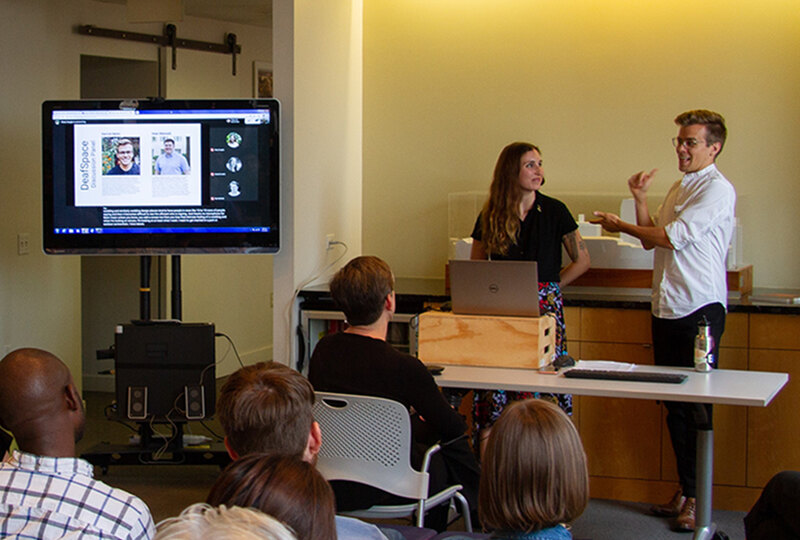LAF Fellowship Spotlight: Toward Universal Design

Members of the 2020-2021 cohort of the LAF Fellowship for Innovation and Leadership have been exploring big ideas and refining their proposed projects. The Fellows will present the culmination of their work at LAF’s Innovation + Leadership Symposium in the summer of 2021. In the meantime, LAF is profiling each Fellow to share more about their progress and personal journeys.
Passed into legislation in 1990, the Americans with Disabilities Act (ADA) ensures numerous protections to people with disabilities, including access to the built environment, and the accompanying ADA Standards for Accessible Design sets minimum requirements to that effect. While the standards make ample mention of wheelchair design protocol, LAF Fellow Alexa Vaughn knows firsthand that they neglect the range of reasonable accommodations that a broad community of 1 billion disabled persons globally requires for their use of public space. For instance, there is little to no mention of the Deaf and Hard of Hearing (HoH) community, nor the Autistic and Neurodivergent communities.
Over her fellowship year, Alexa sets out to shift the common design approach from one that simply complies with the ADA Standards to one that regards them as a bare minimum and creatively expands the possibilities of inclusive design for and with the disabled community. As she develops a suite of disability-specific, mini toolkits to be housed on a forthcoming website, Alexa envisions a public realm in which inclusive design is a natural consideration and prevalent reality. “I truly believe it’s a civil right, not a privilege, for disabled people to be able to freely use public space.”
A Landscape Designer at OLIN and Deaf woman, Alexa brings prior know-how to this endeavor. In 2018, she authored DeafScape, a series of design concepts that apply Gallaudet University’s DeafSpace principles to the public landscape with a mind towards accommodating Deaf and HoH people. Now, she seeks to broaden her arsenal of design solutions through collaboration with disabled stakeholders and experts representative of various disabilities.
“Lack of space and lack of options to move through space can be debilitating for disabled people. We are constantly adapting ourselves to the built environment (which wasn’t built with us in mind), and it can be anxiety-provoking, physically and sensorially demanding, and even traumatic for disabled people to use certain public spaces that exclude them or disregard their needs.” One of the most egregious disservices, in her view, is the preponderance of narrow sidewalks and walkways. Without proper space for two people to walk side-by-side comfortably (that’s at least 10ft wide in busy areas) Deaf and HoH people will experience difficulty communicating since they need to look at one another to sign, lip-read, and/or rely on other visual cues.
Wheelchair users may also encounter obstacles, especially if in the company of other wheelchair users. “We often assume only one disabled person will use a public path at a given time – we need to stop assuming this!” With her toolkits, Alexa hopes to express how Universal Design principles can empower designers to think of ADA Standards as a starting point, not a limitation.
Beyond the physical ramifications of her work, there is a powerful social dimension of Alexa’s fellowship project that is, at once, general and deeply-personal. In broadening the scope of available resources on inclusive design, Alexa is challenging the dominant medical model-thinking, which positions disabled people as needing to be “fixed” or cured, to the social model, which views the built environment as the factor in need of fixing. The social model embraces the idea that having a disability is just another component of identity, rather than something which needs to be rectified to the abled norm. Alexa has been working to strengthen her identity as a Deaf woman, which she hopes will “encourage other folks in design (and in general) to claim their disabled identity if they are struggling to do so... and to be proud of who they are. We all have profound contributions to make to society.
Alexa seeks to accomplish a lot in one year, and her goals extend long beyond the LAF Fellowship. She realizes that as Universal Design becomes more mainstream, it will undergo several iterations before it can address the complete spectrum of accommodations disabled people need. New design elements will need to be tested and informed by qualitative analysis driven by disabled people. And ensuring that these elements become truly ubiquitous may require leveraging additional legal instruments or normative enforcement from professional associations.
For now, Alexa appreciates the opportunity to steer this movement and is dedicating her energy to utilizing the resources at her disposal through the LAF Fellowship, which she sees as the foundation for the next decade of her research. “Starting something this big is never easy. LAF has reminded me that by starting, I am taking a step in the right direction, that my actions and knowledge can have a profound effect on the profession, and even if I am unable to do all the things I want to do in just one year, that I have the power and the budding leadership skills to continue this work throughout my life.”
UPDATE: You can watch Alexa's presentation from the 2021 LAF Innovation + Leadership Symposium here.










